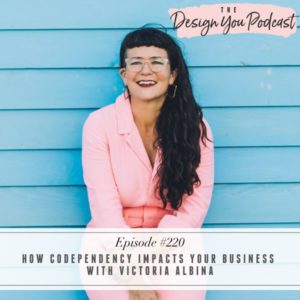
This week, I’m bringing you another episode with another badass guest: Victoria Albina. I’m currently in Victoria’s group, Anchored, and it’s really all about codependency, which is not only something that impacts us personally, but it shows up in our business in ways you’ve probably never realized, so this conversation is going to blow your mind.
Victoria is a life coach with experience in functional medicine and somatic work. She coaches codependent folks socialized as women to stop feeling anxious, exhausted, and overwhelmed so they can have better relationships with their partners, parents, and themselves. The work I’ve done with Victoria has changed the game for me and I can’t wait for you to hear from her too.
Tune in this week to discover what codependency really is and how it’s showing up in your life, and most importantly, your business. We’re discussing where codependent thinking comes from, and how we can ease the thought patterns of people pleasing and perfectionism, instead sharing our best, authentic selves with the world.
Ready to design your mind and reignite that creative spark that the world helped engineer right out of you? Then you’re ready for Design You, my 12-month business and life coaching program designed exclusively for creatives. This is a “thinking out of the box” system for managing your mind, streamlining your schedule, and unbreaking your business. The bonus: You get our 5 signature courses included. But the truth is — what creates real success is how you think… and this is THE program to renovate your brain. Learn more about Design You right here.





